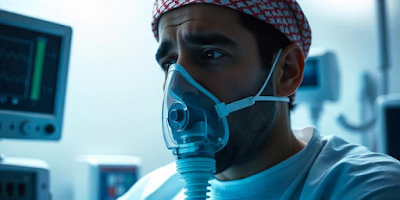The meaning of dyspnea, commonly known as shortness of breath, is a condition that affects millions worldwide. If you've ever felt like you can't catch your breath, you're not alone. This article breaks down everything you need to know about dyspnea—from its meaning to its causes and management.

What is Dyspnea?
Definition of Dyspnea
Dyspnea refers to a subjective experience of breathing discomfort. It can feel like tightness in the chest, a struggle to inhale deeply, or a sense of suffocation. While it's normal to feel breathless after intense exercise, persistent dyspnea may indicate an underlying health issue.
Common Symptoms
· Rapid, shallow breathing
· Chest tightness
· Wheezing or gasping for air
· Difficulty completing sentences due to shortness of breath
Understanding the symptoms is the first step toward identifying the problem and seeking appropriate help.
Causes of Dyspnea
Dyspnea has various causes, broadly categorized into respiratory, cardiac, and other non-cardiopulmonary conditions.
Respiratory-Related Causes
Asthma
A chronic inflammatory condition that narrows the airways, causing wheezing and breathlessness.
Chronic Obstructive Pulmonary Disease (COPD)
This progressive disease limits airflow and is often caused by smoking or long-term exposure to irritants.
Pneumonia
An infection in the lungs that leads to inflammation and fluid accumulation, making it hard to breathe.
Cardiac Causes
Heart Failure
When the heart cannot pump blood effectively, fluid backs up into the lungs, causing breathlessness.
Coronary Artery Disease
Narrowed or blocked arteries reduce blood flow to the heart, leading to chest pain and dyspnea.
Non-Cardiopulmonary Causes
Anxiety Disorders
Stress and anxiety can trigger hyperventilation, making you feel short of breath.
Anaemia
Low red blood cell counts result in reduced oxygen delivery to tissues, causing fatigue and dyspnea.
Obesity
Excess body weight can restrict lung expansion, leading to difficulty breathing.
Diagnosing Dyspnea
Getting to the root cause of dyspnea is crucial for effective treatment.
Medical History and Physical Examination
Your doctor will ask about your symptoms, medical history, and any triggers. A physical exam, including listening to your lungs and heart, is often the starting point.
Diagnostic Tests
Pulmonary Function Tests
These measure how well your lungs work, helping to diagnose conditions like asthma or COPD.
Imaging Studies
Chest X-rays or CT scans can reveal abnormalities in the lungs or heart.
Blood Tests
A blood test can identify asemia or other issues that might contribute to dyspnea.
Managing Dyspnea
Treating Underlying Causes
Medications
Bronchodilators, steroids, and diuretics are often used to treat conditions like asthma, COPD, or heart failure.
Lifestyle Modifications
Quitting smoking, losing weight, and managing stress can significantly improve symptoms.
Symptomatic Relief
Breathing Techniques
Practices like pursed-lip breathing or diaphragmatic breathing can help ease acute symptoms.
Oxygen Therapy
In severe cases, supplemental oxygen can provide immediate relief.
When to Seek Emergency Care
If dyspnea comes on suddenly, is severe, or is accompanied by chest pain, blue lips, or confusion, seek medical help immediately.
Living with Dyspnea
Coping Strategies
Adopt mindfulness and relaxation techniques to manage stress-induced dyspnea.
Support Systems
Join support groups or work with a counselor to navigate the emotional challenges of chronic breathlessness.
Preventative Measures
Regular exercise, a balanced diet, and routine health checkups can prevent many causes of dyspnea.
Conclusion
Dyspnea can be distressing, but understanding its causes and management options empowers you to take control. From simple lifestyle changes to advanced medical treatments, help is available.
FAQs
What is the primary cause of dyspnea?
Dyspnea is most commonly caused by respiratory or cardiac conditions like asthma or heart failure.
Can stress lead to dyspnea?
Yes, stress and anxiety can trigger shortness of breath through hyperventilation.
How is dyspnea treated in emergencies?
Emergency treatments include oxygen therapy, medications like bronchodilators, and addressing the root cause, such as heart issues.
Are there any home remedies for dyspnea?
Breathing techniques and a calm environment can provide relief for mild cases, but persistent symptoms need medical attention.
Is dyspnea always a sign of a serious condition?
Not always. While it can indicate serious issues, it might also result from temporary factors like exercise or stress.
